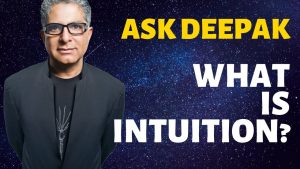Deepak Chopra discusses suffering related to our sense of identity or of who we are – also known as existential suffering.* Does existential suffering arise from awareness of our mortality? What are the causes and how can we remedy this type of suffering? Looking at Vedantic traditions, Deepak explains five reasons that lead to existential suffering and some approaches to prevent and ease it.
ASK DEEPAK is a daily show featuring reflections, thoughts, and inspirations on big questions and current events from writer and philosopher Deepak Chopra. What would you like to Ask Deepak? Leave your question in the comments below or upload a response video.
THE CHOPRA WELL is a new Youtube channel created to encourage people to live healthier, fuller lives, and to be more aware. Deepak, Mallika and Gotham Chopra, along with other friends and experts, join together in this inspiring project for personal and global transformation. The channel features daily shows about spirituality, wellness, healthy living, humor, and much more.





You have contributed greatly to my understanding of spirituality. Thank you Deepak🙏
I ditto Om Bansal 🙏
Conservation of vital energy and transmuting the subtle energies and endocrine precursors to refined spiritual energy. Expending it in daily sensual activities, even excessive conscious thinking impedes the practice. The human organism is designed for procreation, thus it is an uphill challenge against its natural urges. Requires the utmost faith and discipline in the beginning and constant vigilance/mindfulness from start to end. It is all too easy to fall a tree that takes years to grow.
Tenzin Khoo
🐟 15. SUFFERING & HAPPINESS:
To understand the nature of suffering, it is ABSOLUTELY imperative to first distinguish suffering from pain.
There is a spectrum of pleasure and pain, with an extremely narrow neutral mid-point. Obviously, what constitutes a pleasurable or painful experience is dependent on an individual person’s unique preferences. Not everybody likes the taste of chocolate. That feeling of pleasure/pain does NOT come from any external stimulus, believe it or not. It is located entirely in the mind. That is why spiritual adepts are able to renounce practically all pleasure-seeking activities, and find continuous peace, happiness and joy, within themselves (“ātmarāma”, in Sanskrit).
There are THREE kinds of pleasure/pain: physical, psychological, and financial.
For instance, consuming one’s favourite kind of fruit is physically pleasurable. Being hit by a falling coconut – physical pain.
Falling in love is an example of psycho-emotional pleasure. Being angry at another – psychologically painful.
Winning a lottery is an example of financial pleasure. Being robbed – financial pain.
Some “suffer” pain from lack of money. Others “suffer” pain from an abundance of wealth.
Some “suffer” pain from lack of food. Others “suffer” from an abundance of food.
The quality of the “suffering” is different but the NATURE of the “suffering” is the same.
GENUINE suffering, on the other hand, is mistaking oneself to be the AUTHOR of one’s thoughts and actions, and other persons to be fully in control of their own thoughts and deeds.
There are five forms (or symptoms) of suffering – all PSYCHOLOGICAL in nature:
1. Guilt
2. Blame
3. Pride
4. Worry/Anxiety
5. Regrets about the past and expectations for the future/Attachment to outcomes
Suffering can be COMPLETELY transcended by understanding its source and consciously avoiding its manifestations. For example, your mother may have been particularly violent towards you as a child. Her violence was wholly due to her genetics and societal conditioning, neither of which were under her control. Blaming your mother for her actions leads to psychological anguish, which can only be cured by focusing on the sense of “I am”. In other words, by resorting to one’s essential nature (knowing one’s innermost being to be Pure Consciousness, or merely a character in the “Mind of God”), one is emancipated from all suffering.
The initial feeling of anger towards your mother was a natural reaction to her violence, but the enduring resentment is the ACTUAL suffering. Any physical pain you may have experienced was just that – pain. That pain is not to be discounted, but it has probably faded-away into the distant past. The psychological hurt you are currently experiencing is the true suffering and it can easily be negated by a proper attitude to life.
When a man kicks his pet dog, the dog does NOT spend the remaining years of its life being angry or resentful towards its master. Dogs have very little concept of past, present and future, but live their lives from moment to moment. How unfortunate it is that lower animals are naturally more at peace with their circumstances than we highly-evolved human beings!
On a rather personal note, even before I fully grasped this teaching (and when I was a Theist), I sent the following message to my second ex-wife, which illustrates my understanding of her actions:
“I want to assure you that I have absolutely no bitterness towards you WHATSOEVER for persecuting me. You are simply carrying out the orders of your perverted, ignorant mind, and I pray that my Master forgives all your wicked thoughts and acts. My own heart is completely free of anger. I pity you and look forward to the day when you finally turn from sin.”
When one fully imbibes the understanding that life is completely and utterly preordained, and that no living creature has individual free-will (see Chapter 11), one has no choice BUT to quit blaming, shaming, worrying, being prideful, and being attached to the results of his actions. Deep peace and happiness arises naturally as a consequence. Obviously, the understanding of the non-existence of personal freedom (as well as all the other concepts in this Holy Scripture) are also the result of destiny.
To put it very succinctly, true peace/happiness is simply the TRUE self. When the five forms of suffering come to an end (by liberation from the belief in individual “doership”), only unbroken peace of mind remains.
The common belief that happiness originates from sensory or psychological pleasures is an outright falsehood. One can eat only so much chocolate before the pleasure turns to pain. Even a man who fucks hundreds of beautiful women will eventually tire of his sexual conquests, and attempt to seek happiness by another means.
Humans have FOUR objectives, aims, purposes, or goals in life (“Puruṣārtha”, in Sanskrit):
1. PLEASURE (“kāma”, in Sanskrit) includes all forms of sensual stimulation which provides a positive feeling in the mind of any particular individual. Thus pleasure-seeking is a legitimate aim, provided that it causes no real harm to another person or animal.
2. PROSPERITY (“artha”, in Sanskrit) is seeking wealth in the form of real property or money, again, providing it has no detrimental affect on others (in other words, a legitimate means of accumulating wealth).
3. RELIGIOSITY (“dharma”, in Sanskrit) signifies behaviours that are considered to be in accord with established universal principles, including duties, laws, morals, virtues and righteous living.
4. LIBERATION (“mokṣa”, in Sanskrit) is the freedom from suffering, as previously described, and is considered to be the most noble of the four goals. This was traditionally defined as emancipation from the cycle of birth and death (“saṃsāra”, in Sanskrit) or going to Heaven.
As a person goes through childhood, one naturally seeks sensory pleasures. As one enters adulthood, one starts to seek methods of acquiring material wealth. If and when one becomes disillusioned by pleasure and/or wealth, one makes enquiries into self-improvement and religious systems. When none of the former objectives provides the ultimate peace humans are ultimately seeking, one FINALLY aspires for liberation.
“The animal does not have to face the kind of problems, which oppress man and which are created, by the operation of the intellect.
An animal’s sense of consonance and dissonance, affinity and antipathy, is intuitive and in-built as conditioned reflex, rather than subject to the complex interference of ratiocination, by which man is not only aware of his perceptions and actions, but also thinks about them.”
*************
“Pain and pleasure exist for animals, but it is not a problem for them, because the animal does not regret the past pain or fear the future danger.
He lives in the NOW of nature.
It is only the human being, who concerns himself with imagined opposites, as a problem.
There are, in fact, no opposites whatsoever,
except as concepts, produced by the imagination.”
*************
“It is impossible in life, to have the pleasure that is wanted, without the pain that is not wanted.
They are, in fact, mutually interdependent, and therefore, inseparable.”
Ramesh Balsekar,
Indian Spiritual Teacher.
“Suffering exists, but no sufferer can be found.
Actions exist, but no doer of actions is there.
Nirvana exists, but no one who enters it.
The Path exists, but no traveller can be seen.”
Venerable Buddhaghosa,
Visuddhimagga, 513.
On the contrary, existential suffering can be overcome only by having regular sex so that one distracts himself from over thinking about reality, etc.
Jorg Letchler Good call! This guy’s a joke!
I have so much to say that all I can say now is that I LOVE YOU. And i wish I could catch you when you are actually on.
G He’s just quoting things. I asked him a question and he just had negative comments to shoot back at me, trying to demean me. Don’t listen to him. He posts the same thing on all the videos!
I also think that you are so anxious and full of info that you say things that a lot of people may not be able to understand quickly enough.
What are your thoughts on astrology,tarot etc.
Very nicely summed up for us…Thank you! Namaste
🐟 15. SUFFERING & HAPPINESS:
To understand the nature of suffering, it is ABSOLUTELY imperative to first distinguish suffering from pain.
There is a spectrum of pleasure and pain, with an extremely narrow neutral mid-point. Obviously, what constitutes a pleasurable or painful experience is dependent on an individual person’s unique preferences. Not everybody likes the taste of chocolate. That feeling of pleasure/pain does NOT come from any external stimulus, believe it or not. It is located entirely in the mind. That is why spiritual adepts are able to renounce practically all pleasure-seeking activities, and find continuous peace, happiness and joy, within themselves (“ātmarāma”, in Sanskrit).
There are THREE kinds of pleasure/pain: physical, psychological, and financial.
For instance, consuming one’s favourite kind of fruit is physically pleasurable. Being hit by a falling coconut – physical pain.
Falling in love is an example of psycho-emotional pleasure. Being angry at another – psychologically painful.
Winning a lottery is an example of financial pleasure. Being robbed – financial pain.
Some “suffer” pain from lack of money. Others “suffer” pain from an abundance of wealth.
Some “suffer” pain from lack of food. Others “suffer” from an abundance of food.
The quality of the “suffering” is different but the NATURE of the “suffering” is the same.
GENUINE suffering, on the other hand, is mistaking oneself to be the AUTHOR of one’s thoughts and actions, and other persons to be fully in control of their own thoughts and deeds.
There are five forms (or symptoms) of suffering – all PSYCHOLOGICAL in nature:
1. Guilt
2. Blame
3. Pride
4. Worry/Anxiety
5. Regrets about the past and expectations for the future/Attachment to outcomes
Suffering can be COMPLETELY transcended by understanding its source and consciously avoiding its manifestations. For example, your mother may have been particularly violent towards you as a child. Her violence was wholly due to her genetics and societal conditioning, neither of which were under her control. Blaming your mother for her actions leads to psychological anguish, which can only be cured by focusing on the sense of “I am”. In other words, by resorting to one’s essential nature (knowing one’s innermost being to be Pure Consciousness, or merely a character in the “Mind of God”), one is emancipated from all suffering.
The initial feeling of anger towards your mother was a natural reaction to her violence, but the enduring resentment is the ACTUAL suffering. Any physical pain you may have experienced was just that – pain. That pain is not to be discounted, but it has probably faded-away into the distant past. The psychological hurt you are currently experiencing is the true suffering and it can easily be negated by a proper attitude to life.
When a man kicks his pet dog, the dog does NOT spend the remaining years of its life being angry or resentful towards its master. Dogs have very little concept of past, present and future, but live their lives from moment to moment. How unfortunate it is that lower animals are naturally more at peace with their circumstances than we highly-evolved human beings!
On a rather personal note, even before I fully grasped this teaching (and when I was a Theist), I sent the following message to my second ex-wife, which illustrates my understanding of her actions:
“I want to assure you that I have absolutely no bitterness towards you WHATSOEVER for persecuting me. You are simply carrying out the orders of your perverted, ignorant mind, and I pray that my Master forgives all your wicked thoughts and acts. My own heart is completely free of anger. I pity you and look forward to the day when you finally turn from sin.”
When one fully imbibes the understanding that life is completely and utterly preordained, and that no living creature has individual free-will (see Chapter 11), one has no choice BUT to quit blaming, shaming, worrying, being prideful, and being attached to the results of his actions. Deep peace and happiness arises naturally as a consequence. Obviously, the understanding of the non-existence of personal freedom (as well as all the other concepts in this Holy Scripture) are also the result of destiny.
To put it very succinctly, true peace/happiness is simply the TRUE self. When the five forms of suffering come to an end (by liberation from the belief in individual “doership”), only unbroken peace of mind remains.
The common belief that happiness originates from sensory or psychological pleasures is an outright falsehood. One can eat only so much chocolate before the pleasure turns to pain. Even a man who fucks hundreds of beautiful women will eventually tire of his sexual conquests, and attempt to seek happiness by another means.
Humans have FOUR objectives, aims, purposes, or goals in life (“Puruṣārtha”, in Sanskrit):
1. PLEASURE (“kāma”, in Sanskrit) includes all forms of sensual stimulation which provides a positive feeling in the mind of any particular individual. Thus pleasure-seeking is a legitimate aim, provided that it causes no real harm to another person or animal.
2. PROSPERITY (“artha”, in Sanskrit) is seeking wealth in the form of real property or money, again, providing it has no detrimental affect on others (in other words, a legitimate means of accumulating wealth).
3. RELIGIOSITY (“dharma”, in Sanskrit) signifies behaviours that are considered to be in accord with established universal principles, including duties, laws, morals, virtues and righteous living.
4. LIBERATION (“mokṣa”, in Sanskrit) is the freedom from suffering, as previously described, and is considered to be the most noble of the four goals. This was traditionally defined as emancipation from the cycle of birth and death (“saṃsāra”, in Sanskrit) or going to Heaven.
As a person goes through childhood, one naturally seeks sensory pleasures. As one enters adulthood, one starts to seek methods of acquiring material wealth. If and when one becomes disillusioned by pleasure and/or wealth, one makes enquiries into self-improvement and religious systems. When none of the former objectives provides the ultimate peace humans are ultimately seeking, one FINALLY aspires for liberation.
“The animal does not have to face the kind of problems, which oppress man and which are created, by the operation of the intellect.
An animal’s sense of consonance and dissonance, affinity and antipathy, is intuitive and in-built as conditioned reflex, rather than subject to the complex interference of ratiocination, by which man is not only aware of his perceptions and actions, but also thinks about them.”
*************
“Pain and pleasure exist for animals, but it is not a problem for them, because the animal does not regret the past pain or fear the future danger.
He lives in the NOW of nature.
It is only the human being, who concerns himself with imagined opposites, as a problem.
There are, in fact, no opposites whatsoever,
except as concepts, produced by the imagination.”
*************
“It is impossible in life, to have the pleasure that is wanted, without the pain that is not wanted.
They are, in fact, mutually interdependent, and therefore, inseparable.”
Ramesh Balsekar,
Indian Spiritual Teacher.
“Suffering exists, but no sufferer can be found.
Actions exist, but no doer of actions is there.
Nirvana exists, but no one who enters it.
The Path exists, but no traveller can be seen.”
Venerable Buddhaghosa,
Visuddhimagga, 513.
Reverend Eslam Here we go again! He posts the same thing on every Deepak Chopra video!
Kathryn Willette
In the towns and cities of India, one can see many STRAY COWS wandering around, displaying their teats. Similarly, in the Western cities, one can see women wandering the dangerous streets alone, displaying their bosoms and other bodily parts.
Such loose women are no better than STRAY COWS.
Thank you for assistance in understanding